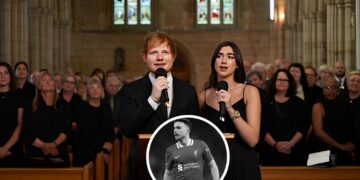The church was silent—but not the kind of silence born from reverence. It was heavy, painful, and filled with grief. Liverpool mourned. A family stood broken. And in the center of it all, a single voice rose—soft at first, then powerful enough to pierce the sorrow that lingered in the air.

A Quiet Arrival, Full of Meaning
Wearing black, without makeup or entourage, Adele entered St. George’s Cathedral unnoticed. She came not as a superstar, but as someone grieving. The private funeral for Diogo Jota, the beloved Liverpool footballer who died suddenly last week, drew together friends, family, teammates, and fans. What united them wasn’t celebration—it was shared heartbreak.
No Spotlight, No Announcement
At a quiet moment, Adele stepped forward. No one introduced her. There were no cameras, no grand gestures. Just a microphone, a room heavy with sorrow, and her voice. She began to sing “Hometown Glory.” What followed was not a performance—it was a release. Her voice, trembling yet firm, filled the cathedral’s stone walls.
A Song That Became a Tribute
“I like it in the city when the air is so thick and opaque…” she sang. Lyrics originally written about London now took on a deeper meaning. In that moment, the song became a eulogy—not only for Diogo Jota, but for the loyalty, love, and fierce hometown pride he represented.

Those Who Witnessed Will Never Forget
A mourner quietly whispered, “It felt like she was singing to his soul.” As Adele neared the final verse, her voice cracked. Not from technical error, but from raw emotion. She paused, wiped a tear from her cheek, then held a soaring final note that rang through the cathedral like a prayer in flight.
Tears and Reverence in the Front Row
In the front pew, Jota’s widow clutched their child tightly. Tears streamed down her face. Liverpool teammates stood with bowed heads—some sobbing openly. Among them, Ringo Starr placed a hand on his chest. His face was solemn, his grief visible. The weight of the moment rested on everyone in that space.
No Applause—Only Silence
When the song ended, no one clapped. What remained was a deep, sacred stillness. Adele gave a small nod, stepped forward, and gently placed a white rose beside Jota’s casket. Then she returned to her seat in silence. Her tribute was done. No speech, no grand exit. Just quiet, and love.

A Personal Promise Kept
Later, a family spokesperson shared that Adele had asked to perform without publicity. “She didn’t want headlines,” they said. “She just wanted to honor him the way only she could—with song.” Her request came not from fame, but from something deeply human: the desire to grieve as one of Liverpool’s own.
The City Grieves Together
Outside, fans lit candles and played “Hometown Glory” on their phones. Many wept together. Across Liverpool, murals appeared overnight. Spray-painted lyrics from Adele’s tribute began to cover brick walls. One line repeated again and again: “My hometown, me and my people…” The city responded not with noise, but with shared remembrance.
– Tekst gaat verder onder de video –
More Than a Song—A Homecoming
What happened inside St. George’s Cathedral wasn’t a concert. It was a sacred moment—grief turned to melody, loss turned to memory. As mourners walked into the gray drizzle outside, one truth became clear. Adele hadn’t just sung at Diogo Jota’s funeral. You felt it in every breath—she sang him home.











